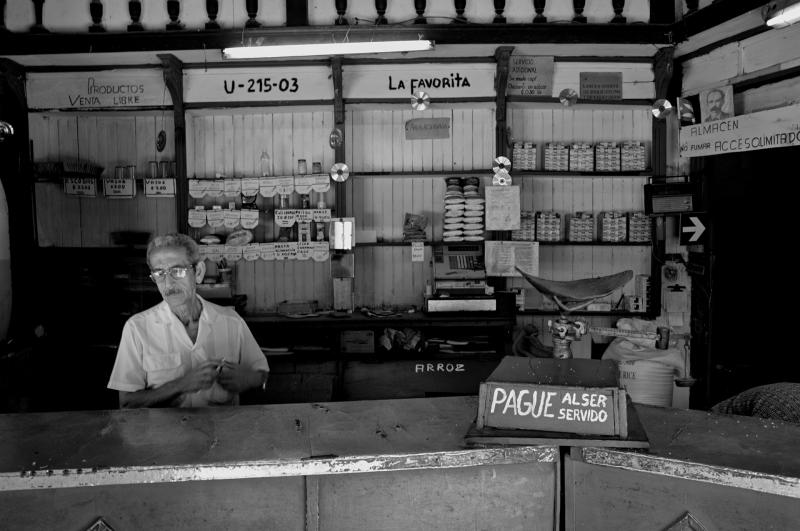The Inverse Logic of Investments in Cuba
by Orlando Luis Pardo Lazo / April 14, 2014 / 1 Comment
Two important points to consider about Cuba’s new investment law.

Interior of Cuban ration store, a hallmark of the Revolution that will soon open its doors to foreign investment, while excluding Cubans. Photo: Glass&Tubes via Flickr.
Cuba’s National Assembly of People’s Power, breaking its usual habit of holding only two meetings each year, met in March 2014 to unanimously approve—as, suspiciously, has been the case for all the laws that have been voted on by the Assembly for decades—a new investment law.

- Is it worth-while to focus on the last images and letters coming from the inside of the last living utopia on Earth? Is Cuba by now a contemporary country or just another old-fashioned delusion in the middle of Nowhere-America? A Cold-War Northtalgia maybe? Can we expect a young Rewwwolution.cu within that Ancien Régime still known as The Revolution? I would like to provoke more questions than answers.

- Orlando Luis Pardo Lazo was born in Havana City and still resides and resists there, working as a free-lance writer, photographer and blogger. He is the author of Boring Home (2009) and is the editor of the independent opinion and literary e-zine Voces.
Commentators will now discuss the legal intricacies and social transformations that this law will bring for the Cuban people and the diaspora.
But for us Cubans on the island or in exile—or rather, us Cubans on the island and in exile, since the difference between the two is less noticeable every day, especially among the younger generations—only two aspects of this parliamentary gem of so-called “twenty-first-century socialism” matter:
1) It is established that Cubans living abroad cannot invest in the national economy that they have left behind.
2) It is established that Cubans living in Cuba cannot invest in the national economy that has left them behind.
For the business people of the rest of the world, the democratic tycoons looking to invest in totalitarianism, only these two aspects should matter, and make a difference:
1) It is established that Cubans living abroad cannot invest in the national economy that they have left behind.
2) It is established that Cubans living in Cuba cannot invest in the national economy that has left them behind.
But there are things that never become true even when repeated a thousand times. And it’s very likely that investors would turn a deaf ear to both points.
Nonetheless, please at least allow me the desperate privilege of anti-journalistically having a third attempt:
1) It is established that Cubans living abroad cannot invest in the national economy that they have left behind.
2) It is established that Cubans living in Cuba cannot invest in the national economy that has left them behind.
Investors of the world unite!





One Comment on "The Inverse Logic of Investments in Cuba"
Trackbacks for this post